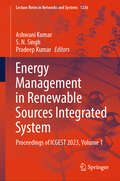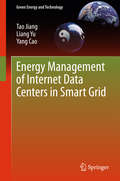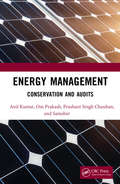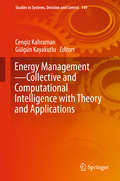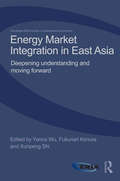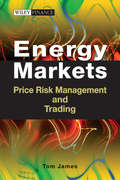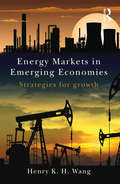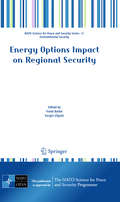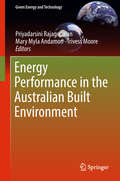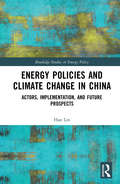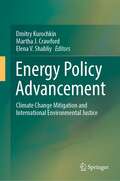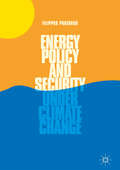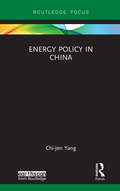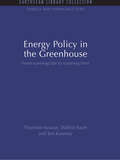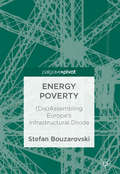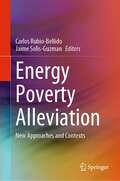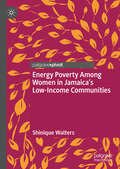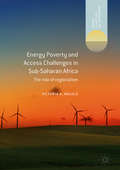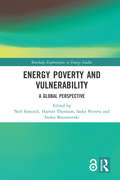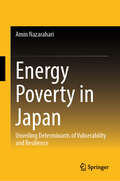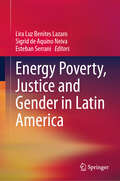- Table View
- List View
Energy Management in Renewable Sources Integrated System: Proceedings of ICGEST 2023, Volume 1 (Lecture Notes in Networks and Systems #1236)
by Ashwani Kumar Pradeep Kumar S. N. SinghThe book constitutes proceedings of the International Conference on Green Energy and Sustainable Technology, ICGEST 2023. The book covers research in energy management, planning the operation of renewable energy systems, distributed generation and energy management, economics/ electricity market and policy/ regulatory aspects, data analytics & AI applications in smart grid. This book contains research papers from academicians, researchers, and students. This book is a valuable resource for students, academics, and practitioners in the industry working on energy areas.
Energy Management of Integrated Energy System in Large Ports (Springer Series on Naval Architecture, Marine Engineering, Shipbuilding and Shipping #18)
by Hao Li Wentao Huang Moduo Yu Nengling TaiThis open access book provides a detailed exploration of energy management in seaport integrated energy systems, highlighting their potential to replace conventional fuel-based energy usage and promote sustainable development of large ports. In order to achieve carbon neutrality, energy management technologies are crucial for the sustainable development of port systems that couple energies, logistics, and maritime transportation. Research on seaport integrated energy systems has attracted scholars and scientists from various disciplines, such as port electrification, logistics, microgrids, renewable energies, energy storages, and port automation. Taking a holistic approach, this book establishes a fundamental framework for the topic and discusses the electrification process, coupling mechanisms and modeling, optimal planning, low-carbon and economic operation, as well as applications of integrated energy systems in seaports. This book is intended for researchers, graduate students, and other readers interested in green seaport energy management and low-carbon operation technologies under the coupling between logistics and multi-energy systems.
Energy Management of Internet Data Centers in Smart Grid
by Tao Jiang Liang Yu Yang CaoThis book reports the latest findings on intelligent energy management of Internet data centers in smart-grid environments. The book gathers novel research ideas in Internet data center energy management, especially scenarios with cyber-related vulnerabilities, power outages and carbon emission constraints. The book will be of interest to university researchers, R&D engineers and graduate students in communication and networking areas who wish to learn the core principles, methods, algorithms, and applications of energy management of Internet data centers in smart grids.
Energy Management: Conservation and Audits
by Anil Kumar Om Prakash Prashant Singh Chauhan Samsher GautamEnergy Management: Conservation and Audit discusses the energy scenario, including energy conservation, management, and audit, along with the methodology supported by industrial examples. Energy economics of systems has been elaborated with concepts of life cycle assessment and costing, and rate of return. Topics such as energy storage, co-generation, and waste heat recovery to energy efficiency have discussed. The challenges faced in conserving energy sources (steam and electricity) have elaborated along with the improvements in the lighting sector. Further, it covers optimization procedures for the development in the industry related to energy conservation. The researchers, senior undergraduate, and graduate students focused on Energy Management, Sustainable Energy, Renewable Energy, Energy Audits, and Energy Conservation. This book covers current information related to energy management and includes energy audit and review all the leading equipment (boilers, CHP, pumps, heat exchangers) as well as procedural frameworks (energy audits, action planning, monitoring). It includes energy production and management from an industrial perspective, along with highlighting the various processes involved in energy conservation and auditing in various sectors and associated methods. It also explores future energy options and directions for energy security and sustainability.
Energy Management—Collective and Computational Intelligence with Theory and Applications: Collective And Computational Intelligence With Theory And Applications (Studies In Systems, Decision And Control #149)
by Cengiz Kahraman Gülgün KayakutluThis book presents a selection of recently developed collective and computational intelligence techniques, which it subsequently applies to energy management problems ranging from performance analysis to economic analysis, and from strategic analysis to operational analysis, with didactic numerical examples. As a form of intelligence emerging from the collaboration and competition of individuals, collective and computational intelligence addresses new methodological, theoretical, and practical aspects of complex energy management problems. The book offers an excellent reference guide for practitioners, researchers, lecturers and postgraduate students pursuing research on intelligence in energy management. The contributing authors are recognized researchers in the energy research field.
Energy Market Integration in East Asia: Deepening Understanding and Moving Forward (Routledge-ERIA Studies in Development Economics)
by Fukunari Kimura Yanrui Wu Xunpeng ShiEast Asian nations through the dialogue between ASEAN and its partners have been promoting energy market integration (EMI) for a decade. The formation of the East Asian Summit (EAS) group in 2005 adds new momentum to the EMI course in the region. The objective of this edited volume is to present new insights into the understanding of EMI in East Asia and draw implications for further development. This book is the first publication of its kind exclusively focusing on EMI in East Asia. The chapters are written by a distinguished group of specialists in the field of energy policy, business and economics. The covered topics range from the general debates about EMI to regional policy responses. A variety of qualitative and quantitative methods are employed in this book. For qualitative methods, public goods theory and the comparative study method are two examples. The quantitative methods include economic growth theory, principle component approach, input-output table, computable general equilibrium (CGE) models and econometric techniques. Important policy implications can be drawn from the findings. One clear message is that EMI should be promoted actively but in a gradual, incremental manner. Other policy implications are related to inter-regional governance, infrastructure development and gas market integration. The content has not been published elsewhere and hence makes a unique contribution to the literature. There are also case studies of specific energy sectors such as petroleum and natural gas. Overall this book should be of interest to a wide audience such as academia, business analysts and policy makers.
Energy Markets
by Tom JamesPrice Risk Management and Trading.Energy risk management expert, Tom James, does it again. His latest book is a timely addition to the rapidly developing energy trading markets. This book should be on every energy trader, risk manager and corporate planer's desk. it is an easy read as Tom goes into great detail to explain the intricacies of this market and its various unique elements. - Peter C. Fusaro, Chairman, Global Change Associates Inc., Best-selling Author and Energy ExpertThis sensible and practical guide is essential for those seeking an understanding of commerce in energy derivatives. beyond merely informative, this hand book for the practitioner details the finer points of the use of derivatives as tools for price-risk management. No energy trading desk should be without it. - Ethan L. Cohen, Senior Director, Utility and Energy Technology, UtiliPoint International Inc.Energy markets are much more volatile than other commodity markets, so risk mitigation is more of a concern. Energy prices, for example, can be affected by weather, geopo9litical turmoil, changes in tax and legal systems, OPEC decisions, analysis' reports, transportation issues, and supply and demand - to name just a few factors. Tom James's book is a practical guide to assessing and managing these risks. It is a must-read for senior management as well as risk and financial professionals.- Don Stowers, Editor, Oil & Gas Financial JournalThis book is the most comprehensive on price risk management-centric efforts. It provides the reader with a tangible experience of derivatives in today's capital and energy markets. The breadth and scope of the passages are immense, in that both developed and developing countries' energy markets are considered and examples applied. Terrific read! - Rashpal Bhatti, Marketing Manager, Energy Trading Asia, Enron/BHP BillitonTom James has simplified the intricacies of a very complex market. In this new market of "hot" commodities, he has been able to give a fresh course to those who are new to the energy markets and a solid review for those that are well seasoned. he covers everything within the oil market from A to Z in this book and does it well. Coming from a financial background myself, it's good to finally find a book that can bring a better understanding to the field of energy commodities. - Carl Larry, Vice President Citi Energy Global Commodities
Energy Markets in Emerging Economies: Strategies for growth
by Henry K. WangEnergy Markets in Emerging Economies addresses current key issues, new opportunities, and various growth strategies relating to the energy markets in key emerging economies. The book addresses key aspects, including key oil and gas energy markets, and their strategic ties to global petrochemical and chemicals, shale gas, and renewable energy growths. It also provides insights on business strategies and market expansion strategies employed by MNCs and state-owned companies in maintaining and defending their positions in the global market, and in developing new markets and opportunities globally, particularly in China, India and the Middle East. The strategic implications of the global oil and gas prices fluctuations on the industries are also discussed. The practical and theoretical perspectives within the commercial context addressed in this book provide a clearer understanding of the energy markets and their leading players, relevant not only to industry players, but also interdependent markets.
Energy Myths and Realities: Bringing Science to the Energy Policy Debate
by Vaclav SmilThere are many misconceptions about the future of global energy often presented as fact by the media, politicians, business leaders, activists, and even scientists, wasting time and money and hampering the development of progressive energy policies. Energy Myths and Realities: Bringing Science to the Energy Policy Debate debunks the most common fallacies to make way for a constructive, scientific approach to the global energy challenge. When will the world run out of oil? Should nuclear energy be adopted on a larger scale? Are ethanol and wind power viable sources of energy for the future? Vaclav Smil advises the public to be wary of exaggerated claims and impossible promises. The global energy transition will be prolonged and expensive, and hinges on the development of an extensive new infrastructure. Established technologies and traditional energy sources are persistent and adaptable enough to see the world through that transition. Energy Myths and Realities brings a scientific perspective to an issue often dominated by groundless assertions, unfounded claims, and uncritical thinking. Before we can create sound energy policies for the future, we must renounce the popular myths that cloud our judgment and impede true progress.
Energy Options Impact on Regional Security
by Sergio Ulgiati Frano BarbirThis book addresses energy-related issues in light of the options available to the European and Mediterranean countries. The articles attempt to identify and analyse the economic, environmental, societal and regional security issues that may emerge from those options. It is clear that a coherent energy strategy is required, addressing energy supply and demand, security of access, financial issues, market dynamics, and also taking into account the whole energy lifecycle including fuel production, transmission and distribution. In the short term, the aim should be to achieve higher energy efficiencies and increased supply from local energy sources, in particular renewable energy sources. In the long term, redesign of life styles, further increase of alternative energy sources and shift to new energy technologies and carriers is expected to contribute to solve or alleviate the problems generated by declining availability of fossil fuels. In this volume, energy experts provide background information and a detailed discussion of all these issues and strategies.
Energy Performance in the Australian Built Environment (Green Energy and Technology)
by Trivess Moore Priyadarsini Rajagopalan Mary Myla AndamonThis book examines energy efficiency in the Australian built environment and presents current developments with a particular focus on the temperate setting of Victoria state. It is divided into four main parts discussing policies, climate, and carbon footprint and presenting case studies on the energy performance and indoor environmental quality of various building types. The book is intended for readers wanting to understand the various policies related to different buildings types and their energy performance.
Energy Policies and Climate Change in China: Actors, Implementation, and Future Prospects (Routledge Studies in Energy Policy)
by Han LinIn the face of growing environmental challenges, including climate change and energy security, countries across the globe are developing new policies and programs to address these challenges, and China is no exception. This book analyses China’s two most significant climate-related energy policies, the Clean Development Mechanism (CDM; including the later Chinese Certified Emission Reduciton – CCER) and the Energy Conservation and Emission Reduction Scheme (ECERS). This work specifically examines the strengths and weaknesses of these policies to highlight the deficiencies and advise how they can be optimised, so China can better achieve its emission reduction goals. It analyses the roles and relationships between relevant actors and identifies how successful their cooperation has been, and what factors have affected it. Importantly, the work draws on a wide range of sources from central ministries to civil society, including interviews with Chinese officials, scholars, energy company managers, environment non-govermental organisation (ENGO) personnel, media reports, and online forum discussions. In doing so, the book not only analyses the thoughts of policymakers, as many works do, but also those implementing the policies and those impacted by the policies. The book concludes by offering detailed and practical solutions to address each specific deficiency in the CDM and ECERS policies, with the aim of providing innovations and alternative approaches to improve current and future policies in China. This book will be of great interest to students, scholars, and policymakers interested in climate change, energy, and Chinese environmental policy and politics.
Energy Policy Advancement: Climate Change Mitigation and International Environmental Justice
by Martha J. Crawford Elena V. Shabliy Dmitry KurochkinThis book states that sustainable development has become an influential discourse worldwide. Climate change is not only an urgent problem, but it is also a fundamental spiritual question concerning social justice and sustainable peace development as well as solidarity among people of various religious backgrounds and different countries. Thus, this global problem must be faced and recognized for future actions and strategies. However, the politics of fear must be replaced with a culture of peace, hope, and compassion, and this urgent problem must be faced with an optimistic attitude and a certain degree of preparedness.Climate change is evident in many forms, such as, for example, the most obvious—recent weather fluctuations that happen around the world. Floods, droughts, and hurricanes are those visible signs of climate change. Human-caused climate change is projected to greatly impact marine, freshwater, and terrestrial life. Temperatures in Alaska and the Arctic have increased over the last 50 years at a rate more than twice as fast as the global average temperature. Poor people are vulnerable to man-made climate change and respond rapidly to its impacts.Diverse knowledge of and approaches to climate change help understand this growing problem; global average air temperature has increased in the recent past by approximately 1.0°C (1.8°F). According to the Climate Science Special Report, the last several years have been record-breaking, and the period of 1901–2016 is the warmest. Greenhouse gas (GHG) emissions are still rising, with damaging effects on the Earth’s climate. At the moment, the concentration of CO2 is higher than at any point in time—at least the past 800,000 years. However, carbon dioxide (CO2) is not the only GHG that impacts human-induced climate change.
Energy Policy and Security under Climate Change
by Filippos ProedrouThis book analyses the trilemma between growth, energy security and climate change mitigation and, breaking from scholarly orthodoxy, challenges the imperative that growth must always come first. It sets forth the argument that a steady-state approach is a more appropriate conceptual mindset to enable energy transition, sets out a steady-state energy policy, and assesses the projected outcomes of its implementation in the realms of energy security, geopolitics and development. By exploring in depth the implications of such a shift, the book aims to demonstrate its positive effects on sustainability, supply security and affordability; to showcase the more favorable geopolitics of renewable energy; and to unpack new pathways towards development. By bringing together ecological economics and mainstream energy politics, fresh insight to energy and climate policy is provided, alongside their broader geopolitical and developmental ramifications.
Energy Policy in China (Routledge Studies in Energy Policy)
by Chi-Jen YangEnergy policy has always been an important part of China’s national policy agenda. Although the overall Chinese economy has become largely market-driven, its energy sectors are still subject to varying degrees of government control. Authoritarian governance allows China to move very quickly in some areas, such as hydropower, nuclear power, wind power, and solar energy. However, conflicting interests have also led to infighting and impasses. With a specific focus on energy supply, Energy Policy in China provides a succinct account of China’s energy policy over the last sixty years. Using separate chapters dedicated to each energy sub-sector, Chi-Jen Yang introduces and discusses both the achievements and failures of the Chinese energy systems, as well as the strengths and insufficiencies of energy governance in China. This book is an interdisciplinary study written for a broad audience, including those researching and working in the fields of energy policy, business strategy, and government administration, as well as Chinese and Asian Studies more broadly.
Energy Policy in the Greenhouse: From warming fate to warming limit (Energy and Infrastructure Set #Vol. 2)
by Florentin Krause Wilfrid Bach Jon KoomeyThe globe is warming and while no one knows what will happen as a result, it is clear that slowing the process is a necessary goal. Other studies have considered 'warming fates', this one brings sophisticated computer modeling to bear on ways of minimizing the risks. Fossil carbon emissions, other trace gases and releases from other sources are all taken into account, and the authors demonstrate the global need to produce a budget for cumulative releases between now and the year 2100. They also demonstrate the need to return to a rate of forest carbon storage equal to that of the mid-1980s. These budgets look at issues of international equity and the ways of moving to a binding agreement. The price of failure to control GHG emissions may be uncertain, but it will be more than anyone can afford. Political will lies at the root of successful climate stabilization and major capital and technology transfers to Third World countries will be needed if there is to be any chance of success. This book provides an agenda for advance.A book [which] throws into stark relief the mountain still to be climbed before the world community can agree on a credible programme to tackle global warming. David Thomas, Financial Times Originally published in 1991
Energy Politics
by Brenda ShafferIt is not uncommon to hear states and their leaders criticized for "mixing oil and politics." The U.S.-led Iraq War was criticized as a "war for oil." When energy exporters overtly use energy as a tool to promote their foreign policy goals, Europe and the United States regularly decry the use of energy as a "weapon" rather than accept it as a standard and legitimate tool of diplomacy.In Energy Politics, Brenda Shaffer argues that energy and politics are intrinsically linked. Modern life--from production of goods, to means of travel and entertainment, to methods of waging war--is heavily dependent on access to energy. A country's ability to acquire and use energy supplies crucially determines the state of its economy, its national security, and the quality and sustainability of its environment. Energy supply can serve as a basis for regional cooperation, but at the same time can serve as a source of conflict among energy seekers and between producers and consumers.Shaffer provides a broad introduction to the ways in which energy affects domestic and regional political developments and foreign policy. While previous scholarship has focused primarily on the politics surrounding oil, Shaffer broadens her scope to include the increasingly important role of natural gas and alternative energy sources as well as emerging concerns such as climate change, the global energy divide, and the coordinated international policy-making required to combat them. Energy Politics concludes with examinations of how politics and energy interact in six of the world's largest producers and consumers of energy: Russia, Europe, the United States, China, Iran, and Saudi Arabia.
Energy Portfolios
by U. Aswathanarayana Rao S. DiviThis book provides an overview of the globally ongoing research and development efforts to reduce carbon emissions and costs, and to improve the efficiency of emerging energy technologies. It covers current and future research and development of Coal, Oil, Natural Gas, Nuclear Power, and Renewable Energy Resources. The author provides optimal size,
Energy Poverty
by Stefan BouzarovskiHuman health and well being are closely intertwined with the ability to access affordable and modern domestic energy services, including heating, cooling, lighting, cooking, and information technology. Energy poverty is said to occur when such amenities cannot be secured up to a socially- and physically- necessitated level. Millions of people across the world suffer from energy poverty due to a combination of financial, social and technical circumstances. Energy Poverty and Vulnerability provides novel and critical perspectives on the drivers and consequences of energy-related injustices in the home. Drawing together original research conducted by leading experts, the book offers fresh and innovative insights into the ways in which hitherto unexplored factors such as cultural norms, environmental conditions and household needs combine to shape vulnerability to energy poverty. Case studies from a wide range of countries are presented, thus providing the first globally-integrated account of a policy and research domain that has previously been divided between the Global South and North. An examination of the diverse manifestations of energy poverty is supplemented by an identification of this condition#65533;s shared and context-specific causes. Conveying policy-relevant insights that can inform decision-making, this book can be of great interest to students and scholars of energy demand, social justice, and sustainability transitions, as well as decision-makers and practitioners who wish to find out more about this complex issue.
Energy Poverty Alleviation: New Approaches and Contexts
by Carlos Rubio-Bellido Jaime Solis-GuzmanThis book presents research on energy poverty alleviation, approaching the complex phenomenon topic holistically and with heterogeneity. It includes contributions from research teams studying the topic at a national, regional and local levels worldwide. The book is divided in two main blocks. The first part, New Approaches, involves novel assessments and concepts from a global and multidisciplinary point of view. The second part, Contexts, offers new theoretical diagnoses focused on case studies of different scales from around the world, and concepts for future trends. Energy Poverty Alleviation will be of interest to policy makers, stakeholders, academics and researchers with knowledge in the energy poverty field.
Energy Poverty Among Women in Jamaica’s Low-Income Communities
by Shinique WaltersThis Palgrave Pivot investigates energy poverty in Jamaica, which is a growing problem that affects the mental, physical, and financial health of individuals, families, and communities, and its specific impact on women. Using quantitative and qualitative methods, this study demonstrates the shared relationship between energy development and economic development. It argues that the development of the energy sector has not been a gender-neutral process and has evolved and transitioned within the context of the global political economy, which has been irrevocably shaped and impacted by the lack of government regulation, an increase in efforts at privatization, and the effects of liberalization in terms of the development. Specifically, it shows that more often than not women bear the burden of sourcing, collecting, and using energy for household activities, agriculture, and income-generating tasks. As such, women are affected by energy poverty in many ways, including but not limited to time burdens and drudgery, health issues and physical burdens, as well as the issues that arise due to restrictions on information. This book will be of interest to students and scholars in gender studies, global development, economics, and politics, as well as policymakers and activists dedicated to gender equality and energy justice.
Energy Poverty and Access Challenges in Sub-Saharan Africa: The role of regionalism (Energy, Climate and the Environment)
by Victoria R. NaluleAccess to modern energy is central in addressing the major global challenges of the 21st century, including poverty, climate change and famine. However large parts of the world, especially in Sub-Saharan Africa (SSA) have poor or no access to modern energy. Victoria Nalule argues that SSA countries have many common energy challenges which could be tackled with collective efforts through regional cooperation. By means of a legal and comparative analysis and a seven-step framework, the book explores the current regional mechanisms employed in Africa to address the challenge of energy poverty and access and whether they are effective in tackling the challenge of energy access, including regional energy infrastructure and regional energy regulations.Chapters discuss the evolution of regionalism in SSA and the role of regional cooperation in the development of renewable energy as a means of confronting both energy access and climate change. Specifically the nexus between energy access, renewable energy and climate change is covered as well as the potential of fossil fuels in addressing energy poverty. The establishment and development of regional energy infrastructure as one of the mechanisms of addressing energy access challenges in SSA and regional efforts to harmonise energy regulation are explored. Finally a concluding chapter provides recommendations for policy makers and other relevant stakeholders on how best to implement some of the suggestions made in previous chapters. International organisations, regional organisations, government officials, scholars and students with interest in the energy sector will highly benefit from this book.
Energy Poverty and Vulnerability: A Global Perspective (Routledge Explorations in Energy Studies)
by Stefan Bouzarovski Neil Simcock Harriet Thomson Saska PetrovaHuman health and well being are closely intertwined with the ability to access affordable and modern domestic energy services, including heating, cooling, lighting, cooking, and information technology. Energy poverty is said to occur when such amenities cannot be secured up to a socially- and physically- necessitated level. Millions of people across the world suffer from energy poverty due to a combination of financial, social and technical circumstances. Energy Poverty and Vulnerability provides novel and critical perspectives on the drivers and consequences of energy-related injustices in the home. Drawing together original research conducted by leading experts, the book offers fresh and innovative insights into the ways in which hitherto unexplored factors such as cultural norms, environmental conditions and household needs combine to shape vulnerability to energy poverty. Case studies from a wide range of countries are presented, thus providing the first globally-integrated account of a policy and research domain that has previously been divided between the Global South and North. An examination of the diverse manifestations of energy poverty is supplemented by an identification of this condition’s shared and context-specific causes. Conveying policy-relevant insights that can inform decision-making, this book can be of great interest to students and scholars of energy demand, social justice, and sustainability transitions, as well as decision-makers and practitioners who wish to find out more about this complex issue.
Energy Poverty in Japan: Unveiling Determinants of Vulnerability and Resilience
by Amin NazarahariThis book stands as the first comprehensive exploration of the intricate issue of energy poverty in Japan. Unveiling a nuanced exploration, the book breaks new ground by focusing on a unique category of households vulnerable to energy poverty, a revelation grounded in meticulously gathered, up-to-date data. The book not only dissects the fundamental aspects of energy poverty in Japan in detail, providing a comprehensive review of Japanese studies on energy poverty, but also introduces an innovative methodology for assessing vulnerability at the grassroots level.What distinguishes this work is its timely examination of global events, such as the Russia–Ukraine conflict and the reverberations of the COVID-19 pandemic, and their profound impact on household vulnerability to energy poverty. As the first-of-its-kind analysis in a developed nation such as Japan, the book offers more than insights; it presents pioneering approaches to confront and mitigate energy poverty.Engaging and data-driven, this book serves as an indispensable guide for policymakers, scholars, and those attuned to the urgent need for universal energy access. Enter a world where knowledge meets action, as this book charts a course towards resilience and equitable energy solutions.
Energy Poverty, Justice and Gender in Latin America
by Lira Luz Benites Lazaro Esteban Serrani Sigrid de Aquino NeivaThis book presents a comprehensive examination of the pivotal challenges and viewpoints about energy poverty, energy justice, and gender diversity challenges within the Latin American energy transition context. Notwithstanding the discourse of progress on energy access espoused by some governments, a considerable number of communities in the region continue to lack reliable electricity, thereby emphasizing a glaring disparity in the distribution of benefits and burdens. Through a nuanced and incisive lens, this book explores the complex landscape of inequality and opportunity, emphasizing the urgent need for inclusive action and systemic transformation. The book employs an interdisciplinary methodology, integrating insights from energy policy, social justice, and gender studies to provide a comprehensive analysis of the complex interrelationship between these domains. It examines the intersection between energy poverty and broader social inequalities, particularly gender disparities, and highlights the necessity for solutions that prioritize the most vulnerable communities. By integrating case studies, real-world examples, and expert analysis, the book offers a more nuanced understanding of the barriers and opportunities for progress. The book offers practical policy recommendations and actionable strategies, making it an invaluable resource for policymakers, NGOs, academics, and stakeholders dedicated to fostering an inclusive, sustainable, and just energy transition in Latin America. It encourages readers to reconsider traditional approaches and to advocate for a new vision where energy justice and gender equality are paramount in the region's development.
